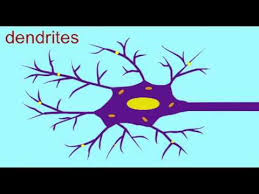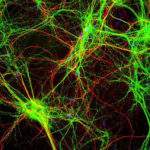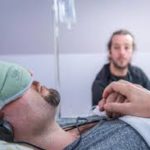Hi again. Sorry I’ve been so…absent…lately, but I’ve had a number of ideas I’d like to share with you in the next few weeks. The first involves psychedelics, whose benefits have long remained mysterious. We are finally getting a glimpse of how psychedelics work to improve mental health. And it’s fascinating. So consider this a sequel to the post before last.
I hope you read Eric Nada’s guest post on the promise of psychedelic therapy for helping overcome addiction. Eric reviewed the therapeutic side of psychedelic therapy, and he stressed the importance of working with a knowledgeable and supportive therapist. He emphasized the transformative power of psychedelics, and pointed out that recovery from addiction requires transformation in how we think and feel.
Here I want to focus on how psychedelics act on the nervous system, whether they are taken in a controlled setting with a therapist or on a hilltop in the forest. How do these drugs actually work? Eric began his post remarking on how counter-intuitive it feels to recommend a drug experience for people trying to overcome addiction. But I’ve never felt quite that way. Psychedelics don’t invite us to be cheered up, entertained or numbed. As Eric also concluded, they invite us to open up and change.
 When I was a young man, dropping acid and climbing trails through the Berkeley Hills, what I experienced was a massive perspective change, an opportunity to be more attuned to the beauty of the natural world and to my own consciousness. During those years I was also fighting my attraction to opiates and other potentially dangerous drugs, and it took me years to resolve those issues. But LSD and psilocybin (magic mushrooms) were different animals. These substances seemed to offer a way to outgrow the rigid perseverance of my mental habits, my stuckness, my depression and my addiction. If only I could rise to the occasion.
When I was a young man, dropping acid and climbing trails through the Berkeley Hills, what I experienced was a massive perspective change, an opportunity to be more attuned to the beauty of the natural world and to my own consciousness. During those years I was also fighting my attraction to opiates and other potentially dangerous drugs, and it took me years to resolve those issues. But LSD and psilocybin (magic mushrooms) were different animals. These substances seemed to offer a way to outgrow the rigid perseverance of my mental habits, my stuckness, my depression and my addiction. If only I could rise to the occasion.
These days we are inundated with research showing that, indeed, psychedelics can help improve mental health. Anxiety and depression have been shown to be reduced by LSD and psilocybin, in various forms and doses, over dozens of studies. In a study of cancer patients, a single dose of psilocybin “produced immediate, substantial, and sustained improvements in anxiety and depression and led to…improved spiritual wellbeing…” Psilocybin has also been shown to help people quit smoking, and to relieve other addictive spirals. Psychedelics prove to be as effective or more effective than conventional antidepressant drugs for relieving depression, even if taken just once or twice. And there are no side-effects, no measurable addiction potential, and very little risk of ongoing thought disturbance. See this recent review and commentary in Scientific American.
The benefits are no longer speculative. They’re real, and mainstream psychiatry is finally starting to embrace them. But what might be the cause of such improvements? Does anybody know?
Recent research suggests that “opening up” with psychedelics has a very distinct biological basis. Published last month in Neuron, this study shows something almost unbelievable to students of the brain. We’ve been convinced (brain-washed?) for at least 50 years that brain cells don’t regenerate. (By brain  cells I mean the “grey matter,” composed of neurons and their thread-like extensions — dendrites and axons.) They are considered the only cell type in the body that does not reproduce, except for a structure called the hippocampus, and even that shows only limited change beyond early adulthood. The ominous conclusion is, of course, that the brain runs down. Aging seems to reveal a brain that loses its plasticity, its capacity for novelty and change, and even its basic functionality. More to the point, mental problems such as addiction and depression are really hard to fix. Both can be seen as products of neural entrenchment. Maybe you can grow new connections, probably that helps, but you’re stuck with the same complement of grey matter you had at the age of 18. How depressing!
cells I mean the “grey matter,” composed of neurons and their thread-like extensions — dendrites and axons.) They are considered the only cell type in the body that does not reproduce, except for a structure called the hippocampus, and even that shows only limited change beyond early adulthood. The ominous conclusion is, of course, that the brain runs down. Aging seems to reveal a brain that loses its plasticity, its capacity for novelty and change, and even its basic functionality. More to the point, mental problems such as addiction and depression are really hard to fix. Both can be seen as products of neural entrenchment. Maybe you can grow new connections, probably that helps, but you’re stuck with the same complement of grey matter you had at the age of 18. How depressing!
But maybe it’s not that way at all. The Neuron article shows that a single dose of psilocybin produced a rapid and long-lasting increase in the size and density of dendritic spines (the “twigs” that grow out of dendrites) throughout the frontal cortex. The subjects of the study were mice, not humans, but that hardly matters. When it comes to the characteristics of brain cells, like cell growth and regeneration, we mammals are all in the same boat. The researchers reported that the change took place rapidly, with 24 hours, and it was still evident one month later. The extent of growth was approximately 10  percent, a huge number when applied to spontaneous brain change. And — get this — neural transmission (excitatory connection strength) increased measurably, while stress-related behaviour diminished.
percent, a huge number when applied to spontaneous brain change. And — get this — neural transmission (excitatory connection strength) increased measurably, while stress-related behaviour diminished.
 So psychedelics appear to actually grow additional grey matter! Note that this is not the same as strengthening or reinforcing synapses, something which occurs during learning but is far less extensive in terms of actual physical change and far more gradual in time. What are the implications? If psychedelics have this kind of firepower, in changing the biological substrate of cognition, then they should be able to induce rapid changes in thinking. In other words, they would be natural habit-breakers! And that’s just what it feels like — that wave of novelty, new paths opening up — to be on psychedelics, whether in a psychiatrist’s office or in the fire-lit circle of an ayahuasca ceremony.
So psychedelics appear to actually grow additional grey matter! Note that this is not the same as strengthening or reinforcing synapses, something which occurs during learning but is far less extensive in terms of actual physical change and far more gradual in time. What are the implications? If psychedelics have this kind of firepower, in changing the biological substrate of cognition, then they should be able to induce rapid changes in thinking. In other words, they would be natural habit-breakers! And that’s just what it feels like — that wave of novelty, new paths opening up — to be on psychedelics, whether in a psychiatrist’s office or in the fire-lit circle of an ayahuasca ceremony.
But when it comes to addiction and other mental-health problems, that’s only half the story. As Eric emphasized in his post, the transformative potential of psychedelics has the greatest traction when it’s guided or 
 directed by someone knowledgeable, whether therapist or shaman, and when we have a chance to process, practice, and consolidate what it is we are learning. As he says, “the healing benefits of psychedelics are not just produced by the compound itself but through the whole of the experience they inspire.”
directed by someone knowledgeable, whether therapist or shaman, and when we have a chance to process, practice, and consolidate what it is we are learning. As he says, “the healing benefits of psychedelics are not just produced by the compound itself but through the whole of the experience they inspire.”
Conclusions? I should clarify that single studies showing remarkable results need replication. That’s next. As well, I’d like to see the present findings jibe with other neurobiological models. In particular, research from a few years back showed that psychedelics increase connectivity across multiple neural regions, in contrast to the usual concentration and boundedness of activation within the default mode network, a region that mediates thoughts about the self (reminiscence, daydreaming, rumination). It would make sense: rapid change in neural maps would be impossible without some kind of “growth booster,” and the rapid, spontaneous improvements reported in the clinical literature point to rapid change.
So, if we take the present results seriously, the conclusion seems pretty straightforward: We use psychotherapy to help people think and understand themselves differently, so that they don’t just respond impulsively or compulsively (as in drug taking) to their needs and fears. It’s been known by various indigenous peoples, for thousands of years, that there are natural chemicals that shake people out of habitual patterns and promote mental change. And now we are starting to learn how this works at the cellular level. Bringing these streams of knowledge together seems an obvious and optimistic route toward improving our mental health…across the board.
P.S. Didn’t your mother tell you that mushrooms are good for you?
 Informed by unparalleled neuroscientific insight and written with his usual flare, Marc Lewis’s The Biology of Desire effectively refutes the medical view of addiction as a brain disease. A bracing and informative corrective to the muddle that now characterizes public and professional discourse on this topic.” —Gabor Maté, M.D., author of In The Realm of Hungry Ghosts: Close Encounters With Addiction
Informed by unparalleled neuroscientific insight and written with his usual flare, Marc Lewis’s The Biology of Desire effectively refutes the medical view of addiction as a brain disease. A bracing and informative corrective to the muddle that now characterizes public and professional discourse on this topic.” —Gabor Maté, M.D., author of In The Realm of Hungry Ghosts: Close Encounters With Addiction
Hello Marc: Thanks for the post on psychedelics. It is timely given the rapid resurgence of interest in their use as a therapeutic agent. I have been discussing with medical colleagues the pros/cons of microdosing as an adjunct therapy for traumatized veterans with addiction problems. From a clinical safety perspective, my concerns are twofold: The first is clearly identifying who is likely to benefit or abreact based on their individual histories. The second comes back to separating real drug effects from placebo (expectancies) in reported outcomes. I don’t believe we have a clear understanding at this point.
And then there is the open question: Do these patients experience better more connected lives over the long term? Even so, the promise of a shift away from standard psychotropics is probably a very good thing in its own right.
Hi John. I wouldn’t worry much about placebo effects. For one thing, placebo effects are often credited with 50% or more of the benefits of standard antidepressants (SSRIs). We might start to think of them as an additional aura or ambience, enhancing rather than replacing drug effects. It feels good to think you’re making progress. I don’t see danger here. As far as abreaction (reliving previous traumas and feeling them intensely), I agree that this is a concern. But it’s hard to know where to draw the line. Many forms of psychotherapy (e.g. IFS, EMDR, psychodynamic, emotion-focused) strive for just that — a return of buried memories — and therapists often feel that the more emotion you get, the greater the potential for change. As an IFS practitioner, I see this myself. Is there a dangerous degree of abreaction? Sure, especially if the person is very fragile or even suicidal. So, yes, keep it in mind, but often psychedelics (especially psilocybin) induce a warm and supportive mood that softens the path to transformation. And start with low doses — that seems the best safeguard.
And yes, the shift away from standard psych drugs would be a huge win for everyone (except drug companies). Antipsychotics suppress and blunt, compromise movement and make you fat; antidepressants confuse or obscure vivid emotions and they’re plain ineffective for most people (not to mention weight gain and sexual dysfunction); anti-anxiety drugs are highly addictive. We can certainly do better!
Hi Mark. I’m wondering if you know much about the MTHFR gene mutation and whether there is an literature about how it might effect a person’s response to serotonergic psychedelics. I did a couple guided psychedelic sessions as well a MDMA last year. I didn’t exactly get what I wanted but probably got some of what I needed from the experiences. My default mode network was considerably tamped down for a few days to maybe a week after each session. I identified that state as having my ‘monkey mind’ quieted down. It reminded me of the Grateful Dead lyric ‘head’s all empty and I don’t care’.
Anyway, I ultimately reverted back to chronic rumibating and felt like somehow I failed with psychedelics, whether it was not being proactive with the ‘integration’ process or having resisted the drug effects. So I decided that maybe it was time to stop trying to ‘self medicate’ and try the more traditional route of psyche meds. I consulted with a psychiatrist who is a strong proponent of nutrition, particularly high dose EPA fish oil. He’s also interested in the potentials of psychedelics. So the first thing he did was test me for the MTHFR mutation and it came back very positive. Supposedly my brain is only making about 12% of the feelgood neurotransmitters. I can’t help wondering if that’s why I didn’t experience more lasting improvements from psilocybin, MDMA, and 5-meo.
Hi Morgan. That’s a fascinating story. No, I know nothing about it, so your comment is all we have here to fill the expertise gap. Still, I have to wonder: what are the feel-good neurotransmitters? The only one I know of (which is actually a peptide, slightly different animal) is the endogenous opioid family of molecules. The other contenders, like our friend dopamine, only feel good in certain circumstances, at certain receptor sites, at certain concentrations, frequencies and timelines. You get lots of dopamine when you need to get away from harm. So…I have to wonder about non-neuro-savvy psychiatrists talking about your intimate neurochemistry. I’d take it with a grain of NaCl.
No psychedelic experience has a money-back guarantee. And I believe you’re right: the integration process is a crucial determinant of change.
BTW, rumibating= mental masturbating 😉
Waiting for randomized, controlled studies comparing various psychedelic agents (placebo not necessary, easily detected by subjects).
“Our children will take electrode trips.” Timothy Leary
\
Thank you for the clarification Mark. The gene mutation, known as the ‘mother-effer’ gene, has somthing to do with making methylfolate. From a quick scan of a NCBI paper I learned that L-Methyfolate is a co-factor in the production of monoamines serotonin, dopamine, and norepinephrine. People with the mutation are unable to make methylfolate. So the psychiatrist added methylfolate to augment the Wellbutrin my GP prescribed for me a few months ago.
I just want to add that I did the pre and post-session integration work with a therapist by Zoom, which is probably not nearly as effective as in-person therapy. I also did my journeying in Air BnBs, not the greatest settings. I’ve also done some art and journaling, as well as ongoing Somatic Experiencing coaching. The concept of integration seems pretty vague and I’m guessing there will be alot of knowledge gained in that area in the coming years. One question I have is can integration happen at any time going forward, as long as the memories are clear? Or is it something that needs to happen during the period of increased neuroplasticity?
Morgan, re your last question: I think the integration process works best when it’s fresh. That’s been my experience and that of friends. But yes, when we go back in memory, especially to the intense feelings and remarkable perspectives experienced during a psychedelic trip, we can continue to integrate…I’d say indefinitely. For me, the flat-out helplessness I wrote about here will no doubt remain a pivot for self-understanding.
Marc, so glad to hear from you–especially on this, currently my favorite subject! Isn’t it amazing that we, as a society, have been led for so long to believe that these compounds do the opposite, that they destroy our brains and make us jump off buildings and such. That they will “melt our brains” if taken even a few times (the old LSD story). So nice to see that they actually do the opposite, that they can help rebuild our neural integrity. DMT (dimethyltryptamine) is being studied by pharmaceutical companies for use directly after people have strokes to keep damage to a minimum. (Not that I hold much hope for what big pharma will do if they figure out how to corner the market on these compounds). Obviously the psychedelic experience can provide quite a psychic punch, so I’m not suggesting that they shouldn’t be approached without appropriate caution, but it seems that at a physiological level, the tryptamines are good for us.
This also shows another important purpose for microdosing (or supplemental dosing), as one can experience the physiological benefits without necessarily having to experience the psychedelic journey.
Let’s keep the conversation going.
Hi Eric. Obviously I couldn’t agree more. There is a delicious irony here, isn’t there: that these drugs can help repair brains, not destroy them. Your mention of DMT and neurological help following strokes is really inspiring. I’m sort of stunned by this, though I guess I shouldn’t be. My one DMT experience felt in some ways like a rebirth. And well, I guess Big Pharma is a necessary evil, but so be it. You need lots of money to run a series of clinical trials. The fallout of this work is likely to be beneficial for all of us, sooner or later.
And I’m glad you mentioned micro-dosing. Many people are beginning to experiment with this method, and a good friend of mine speaks highly (highly?) of the benefits. Though my old-hippie soul wonders: why would anyone not want to experience the journey? I suppose it can be a tad distracting if you’re trying to attend to normal responsibilities.
To be clear, DMT is looking to be applied in a non-psychedelic manner for post-stroke protection. I think it’s unclear as to whether the psychedelic experience is necessary for the neural benefits to apply. And they are talking about nn DMT as opposed to 5 meo DMT, though both seem proven to have neuroprotective qualities.
As far as microdosing, it’s a different animal and will likely not represent a tool that will replace macrodosing. But I find that with the right microdose, there shouldn’t interfere with normal activities at all. Life is all about dosage!
This is only obliquely related to this post, but I heard about a headset that’s being trialled, that could help sufferers of chronic pain ‘retrain’ how their brain responds to nerve signals from the body, using EEG neurofeedback.
The interview is here: http://www.rnz.co.nz/national/programmes/ninetonoon/audio/2018813186/chronic-pain-retraining-the-brain-s-response
The company’s website is https://exsurgo.com.
Hi Karen. There’s been lots of attention lately to EEG headsets, transcranial magnetic stimulation, and quite a few other methods for enhancing neuroplasticity. Norman Doidge wrote two bestsellers about new methods for guided brain change using techniques from lasers to patterned skin tapping. The world of guided neuroplasticity is growing by leaps and bounds, and you’re right to put this in the same camp as psychedelics geared toward mental health enhancement.
So, of I take Psilocybin, mushrooms, will it help with meth addiction????
As the article says, “the transformative potential of psychedelics has the greatest traction when it’s guided or directed by someone knowledgeable, whether therapist or shaman, and when we have a chance to process, practice, and consolidate what it is we are learning.”
Thanks for a nuanced and cogent piece on psychedelics. I can remember when the college wanted to run me out of town for “discussing” the potential benefits of psychedelic therapy for depression and addiction. The charge: Promoting the use of drugs. But they were stymied because my yearly report included research interests in psychedelics for therapeutic purposes. This was 35+ years ago – I’m sure you remember the time. At that time, there were few studies but the results re alcoholism and addiction were impressive. It seemed clear to me that the symptoms of depression – feelings of hopelessness, worthlessness, loss of interest, lack of motivation, focus on failures, self-blame, lack of energy, suicidal thoughts and/or attempts, and just feeling downright depressed most of the time, together with the thought that it would never improve – all were antithetical to the experience with psychedelics. So, again, thanks for your comments.
This is REALLY interesting – so ty . Im wondering however if the whole story is only in the neuron ? but also in some glial cells ??
Mark, thanks for taking the time to reply to my comments. Your account of ayahuasca was harrowing to say the least! I was reminded of a couple instances during the 7 gram psilocybin journey I undertook in 2020, of feelings of utter helplessness. I think it definitely qualified as a bad trip. There was one period when I was feeling really fucked and hopeless and I was certain my guides couldn’t help me. Then the thought came to me ‘maybe I can ask if I can ask for help’. I managed to get the words “can I ask for help” out of my mouth and the lovely young lady next to me said “of course you can”. That moment of contact shifted me into a much better place for a while.
Then there was a moment when I realized the pillow wasn’t supporting my head well. I started to ask in a very whiny, childish voice for help adjusting the pillow. I caught myself before any words came out, I think, and instead was able to say calmly and gently, “can you please push the pillow under my head”. I was met with a very kind, loving response. That felt like a major accomplishment. Pretty soon I probably spirraled into another fear loop, one of which involved ‘seeing’ the end of time, the Universe, and everything. Then it all started back up in reverse, which was a huge relief by the way. At one point I felt so incapacitated that I tried to sit up to just get a different perspective, clear my head, or something and I immediately fell back flat knowing it was futile, I was stranded on that bed. Looking back on it I realize it was probably a similar feeling to when I was an infant left alone in my crib.
Anyway, I appreciate being able to put some more of this stuff down in ‘writting’ to add to the journaling I’ve done. Many blessings Marc.
Hi Marc, very interesting article!
Do you have any thoughts about ketamine and IFS? I have a client with a severe trauma history, chronic pain, depression and a bunch of other diagnoses.
Hi Philip.
Not really. I’ve had limited experience with ketamine. I can imagine how it helps to cut through depression because it loosens the conceptual pieces that lock together in depressive rumination. I suppose a skilled practitioner could guide this process and highlight thoughts and feelings that correspond with one part or another. That could help identifying and unblending parts. Which would certainly help.
All that’s speculative. But given the hodgepodge of problems you mention, it might be worth a try.
Go gently, and good luck!
Thanks for taking the time to reply Marc.
I really appreciate your write up and the sources as well in the article. I was reading a bit about this on the web site I linked up to as well because this is fascinating all the research that is going into Mushrooms currently for depression and other types of ailments people have. While I do feel modern medicine does have quite a few cases where it does great things I think there is also a lot of wisdom and success in natural remedies for people as well.
Shri Shuddhi Nasha Mukti Kendra Bhopal is the most reliable and distinguished rehabilitation center in central India, Madhya Pradesh. 07354887354 Address Plot Number C-12, J.K. Town, near by JK
Road, C Sector, Sarvadharm, Kolar Rd, Bhopal, Madhya Pradesh
462042